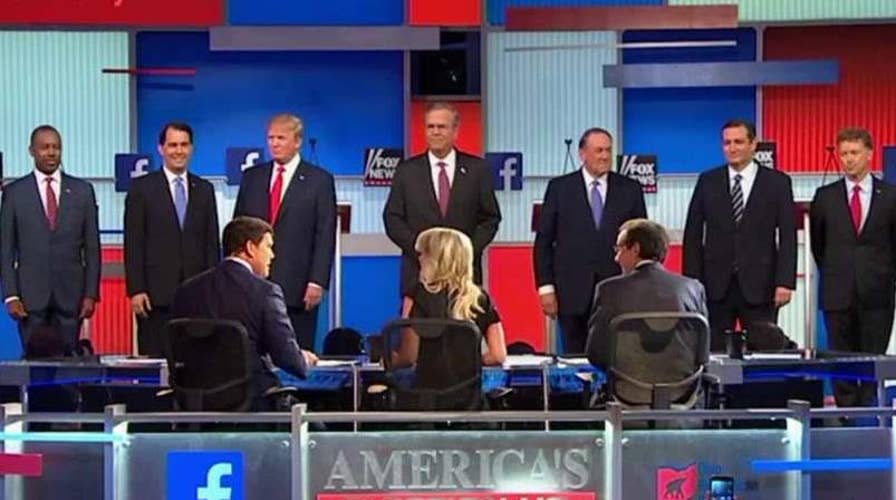FEC Dems voted to punish Fox News over debate sponsorship
Howard Kurtz explains on 'Special Report'
It’s yet another example of government gridlock.
Democrats going after Fox News, Republicans defending Fox News.
Only this time it comes in the context of an FEC investigation, one that raises troubling questions about press freedom.
The Federal Election Commission voted behind closed doors last month on allegations that Fox broke the law at the first presidential debate in Cleveland. The result, first reported by the Washington Examiner, was a 3-3 deadlock and a whole lot of questions.
Why, you might ask, are the feds mucking around with a network’s decisions on political coverage?
“I think it’s dangerous any time someone tries to use the power of the federal government to second-guess, regulate and even punish newsroom editorial decisions,” Republican commissioner Lee Goodman told me yesterday.
All this stems from the debate situation last August, when 17 Republicans were running for president. Fox announced that the top 10 finishers in certain national polls would be featured in a prime-time debate. But the network later decided to add an undercard with the seven other candidates. It was Carly Fiorina’s performance in that “kids’ table” debate that catapulted her into the front ranks.
A rather obscure presidential contender, former Internal Revenue commissioner Mark Everson, filed a complaint with the FEC, saying he wanted to be on the stage as well.
It’s fine to criticize these and other decisions by networks faced with overcrowded stages. But the three Democratic commissioners believe it was a federal case.
They voted that Fox had made an illegal corporate contribution by adding the early-evening debate so the public could see and scrutinize more presidential candidates.
Stuart Gerson, Fox's outside counsel in the case, said the network is "pleased" the case was closed but that it never should have gotten this far. "At least two of the three Democrats are acting for purely political reasons," he said in an interview.
He exempted the third Democrat, Ellen Weintraub, who at first voted against the charges, then proposed that while Fox might be guilty, the case should be dropped as a matter of prosecutorial discretion. Finally, she joined a party-line vote in opposing a finding of no evidence that Fox violated the law. Weintraub stressed that she never voted to punish Fox News.
Gerson called the complaint "insubstantial," saying there were several hundred nominal candidates who, like Everson, "hardly registered" in terms of impact. "The cut had to be made someplace." He said the Democrats' rationale was "kind of nonsensical" because the candidates allowed in the debate were rivals "and Fox wasn't supporting anyone."
Looking back, was Fox unfairly targeted? In a subsequent debate, CNN changed its debate criteria at the eleventh hour to include Fiorina, who had launched a public campaign against the network. Would that have been an illegal contribution as well, especially since one candidate was singled out? Nothing on that from the Democratic commissioners.
We haven’t seen a threat like this since 1980, when the relatively new FEC, born during the post-Watergate reforms, threatened to get an injunction against the Nashua Telegraph for sponsoring a GOP debate in New Hampshire. Ronald Reagan decided to foot the bill himself, causing a ruckus when he excluded certain candidates, prompting the immortal line, “Mr. Green, I am paying for this microphone!”
Here’s the larger problem with the FEC’s move:
The commission operates by law under a press exemption designed to protect journalistic independence. By legally challenging what Fox did in Cleveland, the FEC is taking on what is, in essence, a newsroom decision on how to cover a campaign.
This press exemption, said Gerson, "should have blown the thing away."
The stakes were high. Had one more vote gone the other way, the FEC could potentially have hit Fox with a massive fine that included the production costs and the value of the airtime to the seven contenders.
Despite the deadlock, that message is clear. There could be a chilling effect on news organizations planning future debates. Who, after all, wants to deal with the cost and hassle of defending an FEC investigation?
Fox dodged the bullet this time, but journalism may have lost.













































